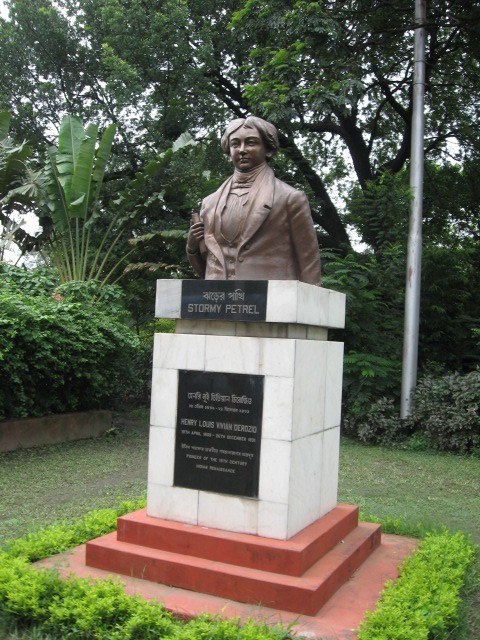
Henry Louis Vivian Derozio
Henry Louis Vivian Derozio (18 April 1809 – 26 December 1831) was an Indian poet and assistant headmaster of Hindu College, Kolkata. He was a radical thinker of his time and one of the first Indian educators to disseminate Western learning and science among the young men of Bengal.
Henry Louis Vivian Derozio
18 April 1809
Calcutta, Bengal Presidency, British India
26 December 1831 (aged 22)
Calcutta, Bengal Presidency, British India
Poet and teacher
English and Bengali
India (British subject)
Academic, Educator
Long after his early death, his legacy lived on among his former students, who came to be known as Young Bengals and many of whom became prominent in social reform, law, and journalism.
Biography[edit]
Early life[edit]
Henry Louis Vivian Derozio was born on 18 April 1809 at Entally-Padmapukur in Kolkata. His parents were Francis Derozio, a Christian Indo-Portuguese office worker, and Sophia Johnson Derozio, an Anglo-Indian woman.[1][2] His original family name was "do Rozário".[3]
Derozio attended David Drummond Dharmatala Academy school from age 6 to 14.[1][3][4] He later praised his early schooling for its liberal approach to education, particularly its unusual choice to teach Indian, Eurasian and European children from different social classes together as peers.[4] Derozio's later religious skepticism is sometimes attributed to David Drummond, who was known as a freethinker.[4] Derozio was a successful student: notices in the India Gazette and the Calcutta Journal at the time mentioned Derozio's academic excellence (including several academic prizes) and successful performances in student plays.[4] While a student, he read the poetry of his contemporaries, John Keats, Percy Shelley, and Lord Byron.[5]
At age 14, Derozio left school to work.[1] He initially joined his father's office in Kolkata, then shifted to his uncle's indigo factory in Bhagalpur.[1] Inspired by the scenic beauty of the banks of the River Ganges, he started writing poetry, which he submitted to the India Gazette.[1] His poetic career began to flourish, with poems published in multiple newspapers and periodicals, in 1825.[4]
In 1827, when Derozio was 18, the editor John Grant took notice of his poetry, offering to publish a book of his work and inviting him to return to Kolkata.[1] He soon became an assistant editor for Grant, as well as publishing in several other periodicals, and founding his own newspaper, the Calcutta Gazette.[1]
Hindu College and Young Bengal[edit]
In May 1826, at age 17, he was appointed teacher in English literature and history at the new Hindu College. Derozio's intense zeal for teaching and his interactions with students created a sensation at Hindu College. He organized debates where ideas and social norms were freely debated.[1] In 1828, he motivated students to form a literary and debating club called the Academic Association.
This was a time when Hindu society in Bengal was undergoing considerable turmoil. In 1828, Raja Ram Mohan Roy established the Brahmo Samaj, which kept Hindu ideals but denied idolatry. This resulted in a backlash within orthodox Hindu society. Derozio helped discuss the ideas for social change already in the air. Despite his youth, he was considered a great scholar and a thinker. Within a short period, he drew around him a group of intelligent boys in college. He constantly encouraged them to think freely, to question, and not to accept anything blindly. His teachings inspired the development of the spirit of liberty, equality, and freedom. They also tried to remove social evils, improve the condition of women and peasants, and promote liberty through freedom of the press, trial by jury, and so on. His activities brought about the intellectual revolution in Bengal. It was called the Young Bengal Movement and his students, also known as Derozians, were fiery patriots.
Due to backlash from conservative parents who disliked his wide-ranging and open discussion of religious issues, Derozio was dismissed from his post in April 1831, shortly before his death.[1]
In 1838, after his death, members of the Young Bengal movement established a second society called the Society for the Acquisition of General Knowledge. Its main objective was to acquire and disseminate knowledge about the condition of the country.